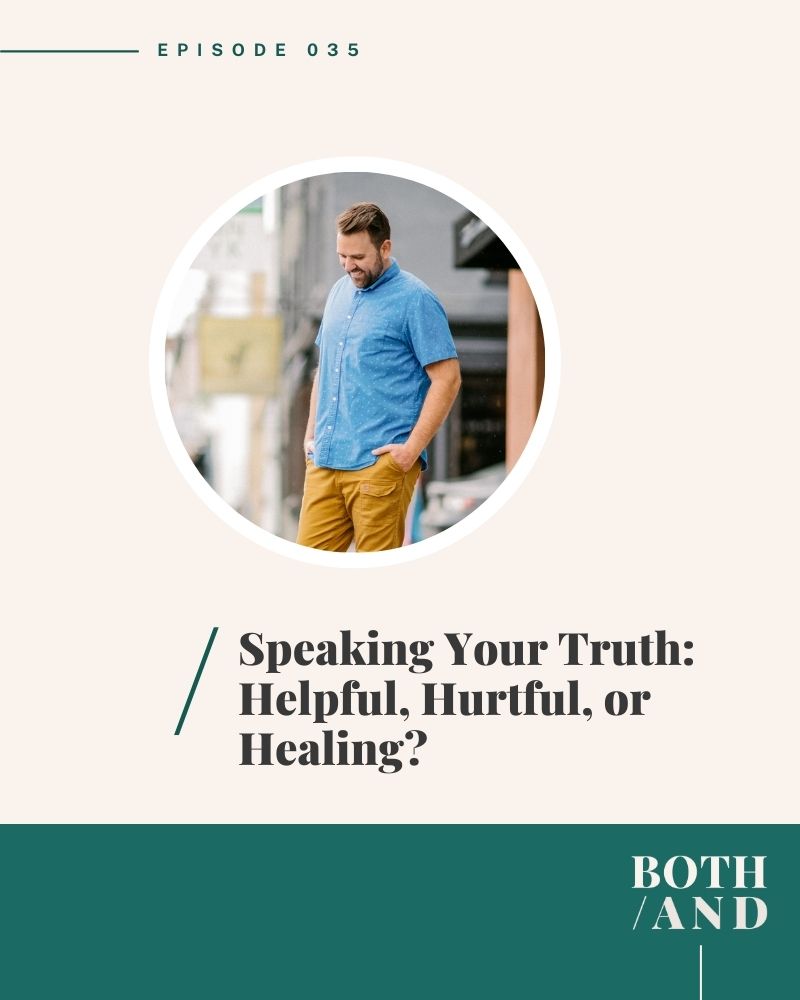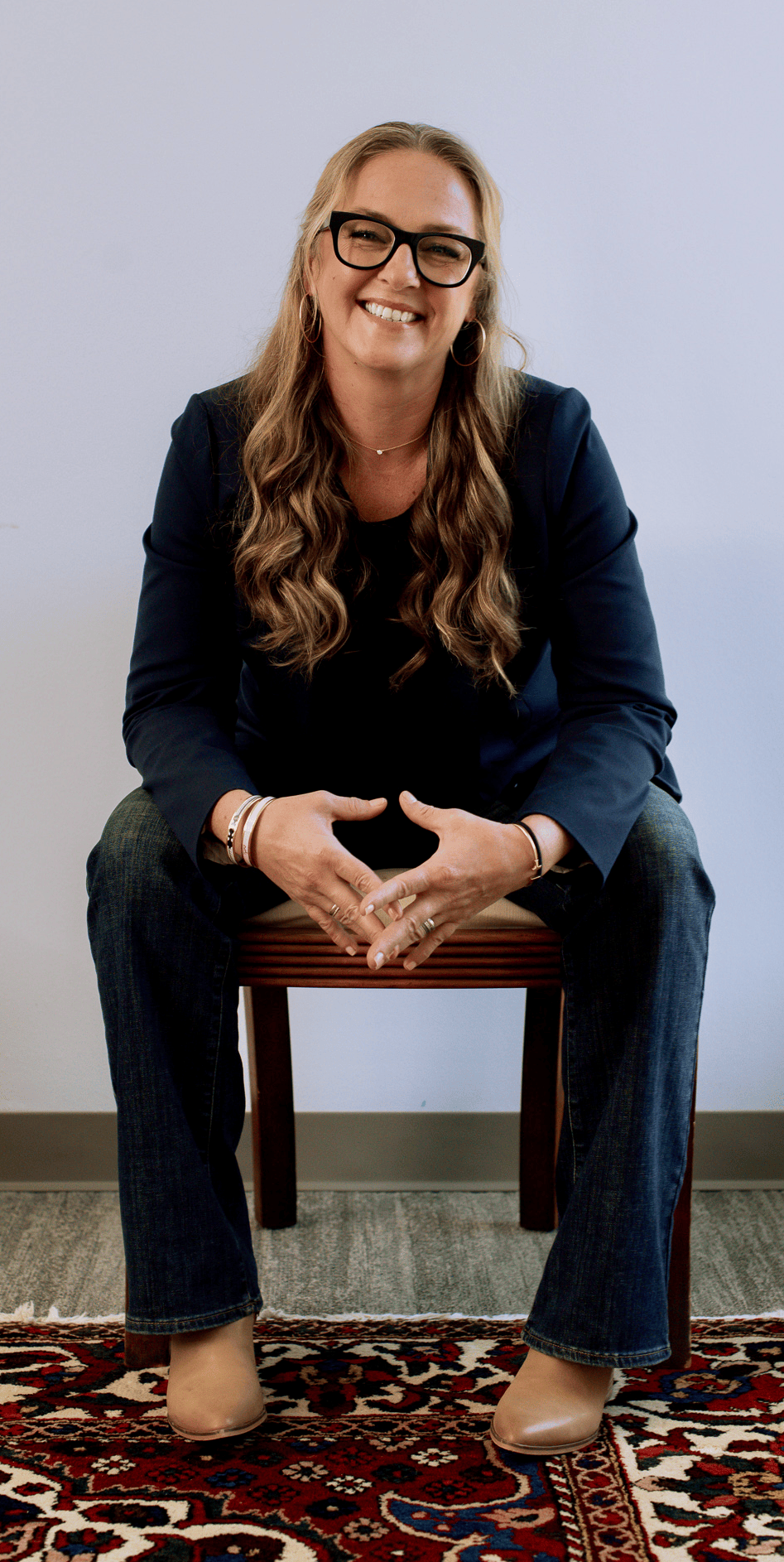
READY TO START A PODCAST? (SAY YES!) Buzzsprout is hands down the easiest and best way to launch, promote, and track your podcast. Click here to get a $20 Amazon gift card if you sign up for a paid plan.
Have you ever been at the receiving end of someone “speaking their truth?” Or they might say, “I just have to own my truth.” It’s relatively common language now. While I believe the original intent behind “speaking our truth” is good and pure. Unfortunately, it’s become an excuse to avoid responsibility for our actions. So “speaking our truth” – is it helpful, hurtful, or healing?
I was involved in a situation recently between two friends. One of them, Friend A, was having issues with the other, Freind B. Friend A wanted to have a conversation and express their frustration.
It was clear this was a one-sided conversation because Friend A didn’t have any solution or even resolution. They only wanted to say what they wanted and let that be that. (As if it would solve the situation.) When it boils down to it, Friend A had issues within themselves that they needed to resolve. They had some work to do on themselves, but instead, they projected all of their frustration onto another person and excused that behavior by saying, “I have to speak my truth.”
It reminded me how frustrating this phrase has become. Listen, I’m guilty of saying this too, but now I know better.
There is always a time and place to express what you’re experiencing, feeling, and thinking. But we need to do that with safe people at appropriate times. As we get deeper into this subject, understand I am not talking about venting to a friend. I’m not talking about those moments when you need someone to listen and hear what you’re saying. I’m talking about the destructive idea that we think we can say whatever we want whenever we want and excuse it by saying, “I’m just speaking my truth.”
Honesty, vulnerability, and transparency are always good for us to practice. The more we do it, the easier it gets. And it’s necessary and good to call out evil in the world—the harmful, destructive things like abuse, injustice, and hatred. We should never put a silencer on expressing these dangerous things against humans. But again, this is not what I mean when I say, “speaking my truth.”
There is a difference between “speaking our truth” and sharing about a trauma inflicted upon us. Of course, we need to speak about things like rape, abuse of every kind, and so forth. We need to expose them and talk about the evil. But that’s not what I’m referring to.
The original intent behind speaking your truth is positive.
As we’ve evolved and learned to embrace our experiences, we’ve also learned to be more authentic and vulnerable. We are more open and honest, and real with each other. (All good things.)
Speaking our truth, at its core, is a method to release shame. We’re letting something out of us that is within. As long as it stays within us, whether our feelings, emotions, or an experience, it can produce shame. Shame wants you to think something is wrong with you. But when we share our experiences that create shame, it loses its power.
When we collectively decided it’s essential to have the freedom and ability to speak our experiences, rather than hide them, we put a dagger into shame. But with that freedom also comes a responsibility to know when and how to use it. You don’t erase shame because you chose to share your experience. You erase shame because you understood that your experience no longer holds power over your worth.
Our freedom to speak about our experiences freely and without repercussion helps diminish shame. Still, we’ve hijacked that freedom and said it means that we must always express our experience regardless of how it makes others feel. This is what I’m talking about when I say, “speak my truth.” It’s the idea that we must always speak about our experience regardless of the repercussions. And even worse, we’ve started to call our experiences truth. Helpful, hurtful, or healing?
Speaking your truth doesn’t make it absolute truth.
There’s this notion that the “truth” speaker thinks that what they’re expressing while under the umbrella of “speaking my truth” makes it absolute truth. But it doesn’t. It is simply is your perspective on your experience.
The word truth in this context is misused. I think a better expression than “speaking our truth” is “I’m going to speak my experience” or “I’m going to own my perspective.”
Truth implies that what we say is 100% accurate, and it’s not. So what happens when I speak my truth, and you speak your truth, and those two experiences don’t line up? Where’s the truth? Who is being the most truthful? What if your truth slings shame at me or my truth slings shame at you? Or what if by speaking your truth, you are asking me to shine less, to be less, to do less, or to make myself smaller? Are those things helpful? Are they hurtful? Are they healing?
What if your truth is entirely 100% false? What if you took your truth into a court of law, and they needed factual evidence and data to support this truth, and you couldn’t provide that?
So, you haven’t spoken the truth. What you’ve done is speak your experience from your perspective. And your perspective is always limited. (Mine too!)
Our perspectives form because of life experiences, cultures, upbringing, religions, faith, traditions, wealth, power, etc. All of our perspectives are personal, which means the way we interpret the world is personal, which means it is not the same as the way other people interpret the world, which means you aren’t speaking your truth. Instead, you’re sharing your experience.
Your experience is 100% real to you in how you interpreted it. But speaking your truth doesn’t make it accurate. Because you believe it’s a fact, however, you give yourself permission to behave and act and engage in unhealthy ways.
Speaking our truth has become a replacement for taking responsibility.
Instead of taking responsibility for our actions, behavior, personal growth, and evolution, we say whatever we want, whenever we want, and put the umbrella of “I’m just speaking my truth” over it all.
We’re not taking responsibility for our role in our good and bad experiences. You have a responsibility for the experiences that you have in your life. And sometimes you are the one that needs to do the work.
By saying, “I just have to speak my truth,” you silence the people around you. The very thing that speaking our truth aimed to do – increase vulnerability, honesty, transparency, and reduce shame – is shut down. Instead, your intention becomes for others to change or fix themselves.
Expressing your experiences isn’t the work of personal evolution. Expressing what you want, when you want, and covering it all over with “I’m speaking my truth” doesn’t solve problems.
Owning your mistakes, taking responsibility for your actions, healthy communication, setting boundaries, conflict resolution, emotional maturity, and healthy emotional expression are some of the things that solve problems.
“Speaking your truth” can’t become a replacement for doing the work on yourself that you don’t want to do.
Let’s go back to the story about my two friends. “Speaking my truth” was a way Friend A was attempting to avoid doing the self-improvement work they needed. It was a way to avoid solving the problem, which only existed within themselves.
It’s a dangerous human notion to think that speaking your truth eradicates the problem that you’re sharing. It’s the idea that if you speak it, you will solve it. Sometimes, it may worsen the situation because you silence the people around you.
Change the phrase.
When you say, “I’m speaking my truth,” you’re sharing your experience from your perspective. So, let’s shift our language and say, “I want to share what I’m experiencing with you, from my perspective.” (Not as catchy, I know, but worth the extra words.)
This allows for a two-way conversation. When you say, “I’m speaking my truth,” it silences everyone because you immediately put up a shield. How can someone argue with the truth? (Remember, we know now that your truth is only 100% true to you.)
When you share your experience, from your perspective, you communicate that what you’re expressing might not be accurately representing what’s happening. As a result, you’re willing to have a conversation. It opens up the dialogue instead of shutting it down.
Before you express, evaluate.
Before you begin to express yourself, you need to evaluate your experiences and ask yourself things like, “what am I hoping to accomplish by expressing myself and sharing this experience?”
What honest answer do you get? Do you want to feel better about yourself? Do you want to make someone else feel worse? Do you want someone to fix your problems for you? Do you want someone to condone your behavior? Do you want someone to support you no matter what? These are all unhealthy reasons to express your experiences. If it’s unhealthy, you might need to vent to a friend and move forward.
Share the experience + your role in it.
We need to learn to share our experiences and our responsibility in creating them. Traumatic situations aside, if you make a decision that every time you “speak your truth,” you will also share what you’re doing to help solve the problem, create solutions, grow yourself, or share what you’re responsible for, it will force you to see that “speaking your truth” might be unnecessary in that situation. Often, you’re going to want to pass on the blame. You’re going to want to pass on the responsibility. You’re going to want to point the finger. When you can learn to see your role and responsibility in every situation, it will force you to evaluate your actions, and that might show you that “speaking your truth” in this situation isn’t the right step.
The original intent behind the phrase “speak your truth” is beautiful, but only when we learn to express our experiences in helpful, healing ways that we move into releasing shame. That’s when we move into embracing vulnerability and transparency.
But most people, unfortunately, use this phrase when they want to express their experience without taking responsibility and they silence those around them. We have to stop doing this.
Let’s learn to evaluate our experiences and identify what role we played in creating them, and then decide if it’s still worth sharing or how you might need to go about sharing it differently.
What Does Speaking Your Truth Mean and is it Helpful, Hurtful, or Healing
Whether through speaking, storytelling, or coaching, I share real experiences, learned and curated wisdom, and practical tools to help you (and humanity) move forward.
I'm a motivational speaker, talk show host, writer, and creative. And I'm a endlessly curious human trying to figure out, well… humans. What makes us successful, fulfilled, disappointed, or stuck? How do our experiences shape us? And more importantly—how do we human better?
If we haven’t met yet, I’m Gentry Lusby.
meet
the
blogger




